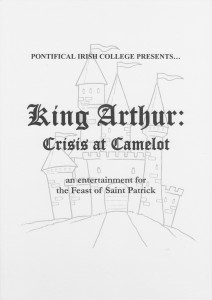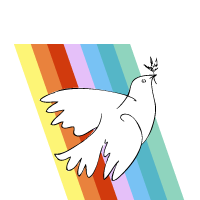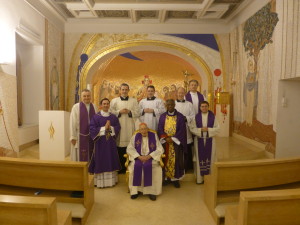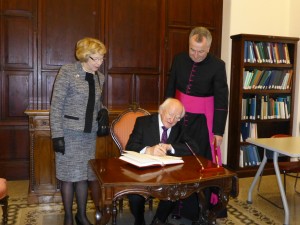St Patrick’s Day 2013 Mass: 10am in St Patrick’s Church
Posted on 08. Mar, 2013 by John Coughlan in Uncategorized
Mass for the Feast of Saint Patrick will be celebrated at 10.00 on St Patrick’s Day, Sunday 17th March 2013, in St Patrick’s Church, Via Boncompagni 31, near Via Veneto. As the Mass in St Patrick’s Church will be the focal point for the Irish community in Rome and friends, and the community of the Irish College will go to St Patrick’s Church for this Mass, there will be no Mass in the Irish College on that morning.
St Patrick’s Celebrations 2013 at the Irish College
Posted on 07. Mar, 2013 by John Coughlan in Uncategorized
All are welcome to the Irish College at 19.00 on Saturday 16th and Sunday 17th March 2013 for the staging of the comedy, ‘King Arthur: Crisis at Camelot’, adapted from a script by Geoff Bamber, directed by Conor McCarthy. This promises to be an evening of laughter and light-hearted enjoyment. There will be a collection on the occasion for this year’s College Lenten charity, the Sant’Egidio Community.
Please note that Mass for the Feast of Saint Patrick will be celebrated at 10.00 on St Patrick’s Day in St Patrick’s Church, Via Boncompagni 31, near Via Veneto. As the Mass in St Patrick’s Church will be the focal point for the Irish community in Rome and friends, there will be no Mass in the Irish College on that morning.
Lent 2013 – College Charity: Sant’Egidio Community
Posted on 07. Mar, 2013 by John Coughlan in Uncategorized
This years Irish College Lenten collection will go towards the Sant’Egidio Community, which cares for the poor of Rome and engages in international peace initiatives. Six of the seminarians work with the Sant’Egidio Community on one evening a week. The collection is being organised by the seminarian charity officers. There is an opportunity to contribute after 10.00 Mass on Sundays. There will also be a chance to contribute on the evenings of the St Patrick’s Day play, ‘King Arthur: Crisis at Camelot’, to be staged at the College on Saturday 16th and Sunday 17th March at 19.00. For more information on the Sant’Egidio Community, see the Community’s website: http://www.santegidio.org/index.php?langID=en
Admission to Candidacy
Posted on 07. Mar, 2013 by John Coughlan in Carousel
Three seminarians of the Irish College were admitted to Candidacy for ordination to Diaconate and Priesthood by Cardinal Peter Turkson, President of the Pontifical Council for Justice and Peace, at Mass on Wednesday, 26th February 2013. Those admitted were: Dominic McGrattan (Diocese of Down and Connor), Liam Boyle (Diocese of Raphoe) and Brian Fitzpatrick (Diocese of Dromore). The candidates are pictured with Monsignor Ciarán O’Carroll, Rector, Rev. Raymond Donnelly, Deacon for the Mass, Cardinal Desmond Connell, Archbishop Emeritus of Dublin, Cardinal Peter Turkson, celebrant of the Mass, Fr George Hayes, Vice Rector, and Fr Hugh Clifford, Director of Formation. For photographs of the occasion, see http://www.flickr.com/photos/irishcollege/sets/72157632864367377/
Visit of President Michael D. Higgins
Posted on 07. Mar, 2013 by John Coughlan in Carousel
On Friday, 8th February 2013, the President of Ireland, Mr Michael D. Higgins and his wife, Mrs Sabina Higgins visited the Pontifical Irish College, Rome, during an official visit by the President to Italy. President and Mrs. Higgins are seen in this picture signing the Visitors Book, accompanied by Monsignor Ciarán O’Carroll, Rector of the College. For photos of the occasion, see http://www.flickr.com/photos/irishcollege/sets/72157632714816743/
Ministry of Acolyte
Posted on 16. Jan, 2013 by John Coughlan in Carousel
On Wedneday, 16th January 2013, four seminarians of the Pontifical Irish College were conferred with the Ministry of Acolyte by Archbishop Arthur Roche, Secretary of the Congregation for Divine Worship and the Discipline of the Sacraments, in the College Chapel. The new Acolytes are: Conor McCarthy (Diocese of Down and Connor), Matthew Dillon (Diocese of Down and Connor), Stephen Duffy (Diocese of Clogher), and Marius O’Reilly (Diocese of Cork and Ross).
Picture shows Archbishop Roche with the four new Acolytes, and (left to right): Rev. Raymond Donnelly, Deacon for the Mass, Monsignor Ciarán O’Carroll, Rector, Fr Hugh Clifford, Director of Formation, and Fr George Hayes, Vice Rector.
‘As one set aside in a special way for the service of the altar, the acolyte should learn all matters concerning public divine worship and strive to grasp their inner spiritual meaning: in that way he will be able each day to offer himself entirely to God, be an example to all by his gravity and reverence in Church, and have a sincere love for the Mystical Body of Christ, the people of God, especially for the weak and the sick.’ – Pope Paul VI, Apostolic Letter given motu proprio: Ministeria quaedam, 15 August 1972.
Irish College Deacon assists Pope at Mass in Sistine Chapel
Posted on 11. Jan, 2013 by John Coughlan in Carousel
On Sunday, 13th January 2013, Rev. Raymond Donnelly, a Deacon studying at the Pontifical Irish College, Rome, for the Diocese of Clogher, was one of the Deacons for Mass for the Feast of the Baptism of the Lord in the Sistine Chapel, celebrated by Pope Benedict XVI.
Happy Christmas!
Posted on 21. Dec, 2012 by John Coughlan in Uncategorized
A very happy Christmas to all our website visitors from the community of the Irish College, Rome .
Le gach dea ghuí agus beannacht don Nollaig agus don Athbhliain.
Buon Natale!
‘If God does not also have power over matter, then he simply is not God. But he does have this power, and through the conception and resurrection of Jesus Christ he has ushered in a new creation. So as the Creator he is also our Redeemer. Hence the conception and birth of Jesus from the Virgin Mary is a fundamental element of our faith and a radiant sign of hope.’
– Joseph Ratzinger – Pope Benedict XVI, Jesus of Nazareth; The Infancy Narratives. Philip J. Whitmore, trans. New York: Image, 2012, p.57.
Irish College Advent Carol Service 2012
Posted on 12. Dec, 2012 by John Coughlan in Carousel
The annual Service of Readings and Carols followed by festivities and refreshments will take place at the Irish College, Rome on Sunday, 16th December at 17.00. All warmly invited.
Ordinations 2012
Posted on 19. Jun, 2012 by John Coughlan in Carousel

Ordinations to the Priesthood 2012
You are asked to remember the students of the Irish College who will be ordained to the priesthood this summer which include:
Roberto Corongiu of the diocese of Lanusei who will be ordained to the priesthood by His Excellency Mons Antioco Piseddu, Bishop of Lanusei on Saturday 29 June 2012 at the parish Church of Perdasdefogu;
Ryan McAleer of the archdiocese of Armagh who will be ordained to the priesthood by His Eminence Seán Cardinal Brady, Archbishop of Armagh on Sunday 1 July, 2012 at St Patrick’s Cathedral, Armagh;
Patrick Lagan of the diocese of Derry who will be ordained to the priesthood by Most Revd Francis Lagan, Retired Auxiliary Bishop of Derry on Sunday 8 July 2012 at St Patrick’s Church, Glen, Maghera, Co. Derry;
Conor McGrath of the diocese of Down and Connor who will be ordained to the priesthood by Most Revd Noel Treanor, Bishop of Down and Connor on Sunday 8 July, 2012 at Saint Benard’s Church, Glengormley, Newtownabbey, Co. Antrim;
Daniele de Angelis of the diocese of Ascoli Piceno who will be ordained to the priesthood by His Excellency Mons. Silvano Montevecchi, Bishop of Ascoli Piceno on Sunday 11 August 2012 at 18.30 at the Cathedral;
John Harris of the diocese of Waterford and Lismore who will be ordained to the priesthood by Most Revd William Lee, Bishop of Waterford and Lismore on Sunday 2 September 2012 at St Nicholas’ Church, Ballyduff, Kilmeaden, Co Waterford.
Ordinations to the Diaconate 2012

Three Irish College seminarians were ordained to the diaconate on Easter Monday, 9 April 2012. The ceremony took place in the Basilica di San Marco Evangelista al Campidoglio and the ordaining prelate was Most Revd Liam MacDaid Bishop of Clogher. The new deacons are Raymond Donnelly, Diocese of Clogher, Micheál McGavigan, Diocese of Derry and Paul Murphy, Archdiocese of Armagh. You are kindly asked to remember them in your prayers.
During the Mass, Bishop MacDaid addressed the following words to the new deacons and to the congregation.
Fellow priests and dear friends,
When the three disciples went up the mountain with the Lord and saw him transfigured, they exclaimed, “It is good for us to be here.” I think we can echo those sentiments this morning. It is a privilege for us all to be gathered here in this historical city, which has had a central role in the history of civilisation and in the life of the Christian community since the time of its founder.
In a beautifully crafted foreword to our booklet, Fr Ciaran O’Carroll, Rector of the Pontifical Irish College inRome, has welcomed us here and we have all felt and appreciated the warmth of that welcome. We say thank you to him, to Fr Albert McDonnell, Vice-Rector, to Fr Chris Hayden, Spiritual Director and Fr Billy Swan, Director of Formation. The Irish Church has entrusted the care of these three young men and others to your hands. We do not feel it an exaggeration to say that their progress, under the guidance of God’s grace, is an advertisement for the quality of help and direction which they received.
Most of you here present are family, friends and mentors of the three ordinands. I congratulate and compliment above all others the parents. You have had the central role in witnessing to the love of God in bringing up your children. You have clearly been for them a living inspiration in how they chose to use the life God gave them through you. Family members, friends and mentors, you bring to St Mark’s Basilica today your own experiences and memories of your relationship and friendship. Your thoughts and prayers will bring a special significance to this ordination.
Today is above all a defining one in the lives of Raymond, Micheál, and Paul. You have made a courageous decision to offer your lives in selfless service to the people of God. In so doing, you have God’s own pledge of support and you have the love and encouragement of all present, as well as of many others who could not be here. You have tested your calling and now decision time has arrived. After much thought, prayer and advice you have decided to accept the demands of this life of service in a spirit of self-denial, for the sake of what can be given and received. It is with an overflowing sense of affection and encouragement that we ask God to bless your lives and ministry. We are aware of what you are undertaking in becoming official ministers of the Church and in entering the last stage of preparation for priesthood. May God pour out his Spirit on you, may you be rooted and grounded in the love of Christ, and in loving others as Christ loved you may your life and ministry bear much fruit. Amen.
MESSAGE OF THE HOLY FATHER
FOR THE 49th WORLD DAY
OF PRAYER FOR VOCATIONS
29 APRIL 2012 FOURTH SUNDAY OF EASTER
Theme: Vocations, the Gift of the Love of God
Dear Brothers and Sisters,
The 49th World Day of Prayer for Vocations, which will be celebrated on 29 April 2012, the Fourth Sunday of Easter, prompts us to meditate on the theme: Vocations, the Gift of the Love of God.
The source of every perfect gift is God who is Love – Deus caritas est: “Whoever remains in love remains in God and God in him” (1 Jn 4:16). Sacred Scripture tells the story of this original bond between God and man, which precedes creation itself. Writing to the Christians of the city of Ephesus, Saint Paul raises a hymn of gratitude and praise to the Father who, with infinite benevolence, in the course of the centuries accomplishes his universal plan of salvation, which is a plan of love. In his Son Jesus – Paul states – “he chose us, before the foundation of the world, to be holy and without blemish before him in love” (Eph 1:4). We are loved by God even “before” we come into existence! Moved solely by his unconditional love, he created us “not … out of existing things” (cf. 2 Macc 7:28), to bring us into full communion with Him.
In great wonderment before the work of God’s providence, the Psalmist exclaims: “When I see the heavens, the work of your hands, the moon and the stars which you arranged, what is man that you should keep him in mind, mortal man that you care for him?” (Ps 8:3-4). The profound truth of our existence is thus contained in this surprising mystery: every creature, and in particular every human person, is the fruit of God’s thought and an act of his love, a love that is boundless, faithful and everlasting (cf. Jer 31:3). The discovery of this reality is what truly and profoundly changes our lives. In a famous page of the Confessions, Saint Augustine expresses with great force his discovery of God, supreme beauty and supreme love, a God who was always close to him, and to whom he at last opened his mind and heart to be transformed: “Late have I loved you, O Beauty ever ancient, ever new, late have I loved you! You were within me, but I was outside, and it was there that I searched for you. In my unloveliness I plunged into the lovely things which you created. You were with me, but I was not with you. Created things kept me from you; yet if they had not been in you they would have not been at all. You called, you shouted, and you broke through my deafness. You flashed, you shone, and you dispelled my blindness. You breathed your fragrance on me; I drew in breath and now I pant for you. I have tasted you, now I hunger and thirst for more. You touched me, and I burned for your peace.” (X, 27.38). With these images, the Saint of Hippo seeks to describe the ineffable mystery of his encounter with God, with God’s love that transforms all of life.
It is a love that is limitless and that precedes us, sustains us and calls us along the path of life, a love rooted in an absolutely free gift of God. Speaking particularly of the ministerial priesthood, my predecessor, Blessed John Paul II, stated that “every ministerial action – while it leads to loving and serving the Church – provides an incentive to grow in ever greater love and service of Jesus Christ the head, shepherd and spouse of the Church, a love which is always a response to the free and unsolicited love of God in Christ” (Pastores Dabo Vobis, 25). Every specific vocation is in fact born of the initiative of God; it is a gift of the Love of God! He is the One who takes the “first step”, and not because he has found something good in us, but because of the presence of his own love “poured out into our hearts through the Holy Spirit” (Rom 5:5).
In every age, the source of the divine call is to be found in the initiative of the infinite love of God, who reveals himself fully in Jesus Christ. As I wrote in my first Encyclical, Deus Caritas Est, “God is indeed visible in a number of ways. In the love-story recounted by the Bible, he comes towards us, he seeks to win our hearts, all the way to the Last Supper, to the piercing of his heart on the Cross, to his appearances after the Resurrection and to the great deeds by which, through the activity of the Apostles, he guided the nascent Church along its path. Nor has the Lord been absent from subsequent Church history: he encounters us ever anew, in the men and women who reflect his presence, in his word, in the sacraments, and especially in the Eucharist” (No. 17).
The love of God is everlasting; he is faithful to himself, to the “word that he commanded for a thousand generations” (Ps 105:8). Yet the appealing beauty of this divine love, which precedes and accompanies us, needs to be proclaimed ever anew, especially to younger generations. This divine love is the hidden impulse, the motivation which never fails, even in the most difficult circumstances.
Dear brothers and sisters, we need to open our lives to this love. It is to the perfection of the Father’s love (cf. Mt 5:48) that Jesus Christ calls us every day! The high standard of the Christian life consists in loving “as” God loves; with a love that is shown in the total, faithful and fruitful gift of self. Saint John of the Cross, writing to the Prioress of the Monastery of Segovia who was pained by the terrible circumstances surrounding his suspension, responded by urging her to act as God does: “Think nothing else but that God ordains all, and where there is no love, put love, and there you will draw out love” (Letters, 26).
It is in this soil of self-offering and openness to the love of God, and as the fruit of that love, that all vocations are born and grow. By drawing from this wellspring through prayer, constant recourse to God’s word and to the sacraments, especially the Eucharist, it becomes possible to live a life of love for our neighbours, in whom we come to perceive the face of Christ the Lord (cf. Mt 25:31-46). To express the inseparable bond that links these “two loves” – love of God and love of neighbour – both of which flow from the same divine source and return to it, Pope Saint Gregory the Great uses the metaphor of the seedling: “In the soil of our heart God first planted the root of love for him; from this, like the leaf, sprouts love for one another.” (Moralium Libri, sive expositio in Librum B. Job, Lib. VII, Ch. 24, 28; PL 75, 780D).
These two expressions of the one divine love must be lived with a particular intensity and purity of heart by those who have decided to set out on the path of vocation discernment towards the ministerial priesthood and the consecrated life; they are its distinguishing mark. Love of God, which priests and consecrated persons are called to mirror, however imperfectly, is the motivation for answering the Lord’s call to special consecration through priestly ordination or the profession of the evangelical counsels. Saint Peter’s vehement reply to the Divine Master: “Yes, Lord, you know that I love you” (Jn 21:15) contains the secret of a life fully given and lived out, and thus one which is deeply joyful.
The other practical expression of love, that towards our neighbour, and especially those who suffer and are in greatest need, is the decisive impulse that leads the priest and the consecrated person to be a builder of communion between people and a sower of hope. The relationship of consecrated persons, and especially of the priest, to the Christian community is vital and becomes a fundamental dimension of their affectivity. The Curé of Ars was fond of saying: “Priests are not priests for themselves, but for you” (Le cure d’Ars. Sa pensée – Son cœur, Foi Vivante, 1966, p. 100).
Dear brother bishops, dear priests, deacons, consecrated men and women, catechists, pastoral workers and all of you who are engaged in the field of educating young people: I fervently exhort you to pay close attention to those members of parish communities, associations and ecclesial movements who sense a call to the priesthood or to a special consecration. It is important for the Church to create the conditions that will permit many young people to say “yes” in generous response to God’s loving call.
The task of fostering vocations will be to provide helpful guidance and direction along the way. Central to this should be love of God’s word nourished by a growing familiarity with sacred Scripture, and attentive and unceasing prayer, both personal and in community; this will make it possible to hear God’s call amid all the voices of daily life. But above all, the Eucharist should be the heart of every vocational journey: it is here that the love of God touches us in Christ’s sacrifice, the perfect expression of love, and it is here that we learn ever anew how to live according to the “high standard” of God’s love. Scripture, prayer and the Eucharist are the precious treasure enabling us to grasp the beauty of a life spent fully in service of the Kingdom.
It is my hope that the local Churches and all the various groups within them, will become places where vocations are carefully discerned and their authenticity tested, places where young men and women are offered wise and strong spiritual direction. In this way, the Christian community itself becomes a manifestation of the Love of God in which every calling is contained. As a response to the demands of the new commandment of Jesus, this can find eloquent and particular realization in Christian families, whose love is an expression of the love of Christ who gave himself for his Church (cf. Eph 5:32). Within the family, “a community of life and love” (Gaudium et Spes, 48), young people can have a wonderful experience of this self-giving love. Indeed, families are not only the privileged place for human and Christian formation; they can also be “the primary and most excellent seed-bed of vocations to a life of consecration to the Kingdom of God” (Familiaris Consortio, 53), by helping their members to see, precisely within the family, the beauty and the importance of the priesthood and the consecrated life. May pastors and all the lay faithful always cooperate so that in the Church these “homes and schools of communion” may multiply, modelled on the Holy Family of Nazareth, the harmonious reflection on earth of the life of the Most Holy Trinity.
With this prayerful hope, I cordially impart my Apostolic Blessing to all of you: my brother bishops, priests, deacons, religious men and women and all lay faithful, and especially those young men and women who strive to listen with a docile heart to God’s voice and are ready to respond generously and faithfully.
From the Vatican, 18 October 2011
BENEDICTUS PP. XVI




